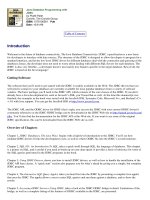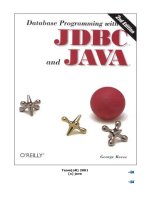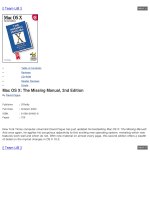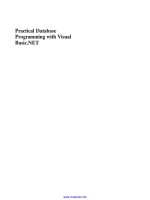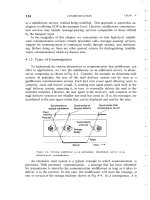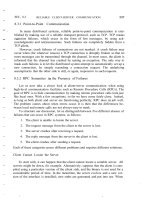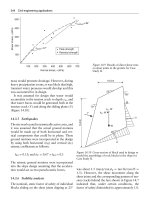o''''reilly database programming with JDBC and Java 2nd edition phần 9 pptx
Bạn đang xem bản rút gọn của tài liệu. Xem và tải ngay bản đầy đủ của tài liệu tại đây (323.51 KB, 25 trang )
JDBC and Java 2
nd
edition
p
age 199
void clearWarnings( ) throws SQLException;
void close( ) throws SQLException;
void deleteRow( ) throws SQLException;
int findColumn(String cname) throws SQLException;
boolean first( ) throws SQLException;
Array getArray(int index) throws SQLException;
Array getArray(String cname) throws SQLException;
InputStream getAsciiStream(int index)
throws SQLException;
InputStream getAsciiStream(String cname)
throws SQLException;
InputStream getBinaryStream(int index)
throws SQLException;
InputStream getBinaryStream(String cname)
throws SQLException;
BigDecimal getBigDecimal(int index)
throws SQLException;
#BigDecimal getBigDecimal(int index, int scale)
throws SQLException;
BigDecimal getBigDecimal(String cname)
throws SQLException;
#BigDecimal getBigDecimal(String cname, int scale)
throws SQLException;
InputStream getBinaryStream(int index)
throws SQLException;
InputStream getBinaryStream(String cname)
throws SQLException;
Blob getBlob(int index) throws SQLException;
Blob getBlob(String cname) throws SQLException;
boolean getBoolean(int index) throws SQLException;
boolean getBoolean(String cname) throws SQLException;
byte getByte(int index) throws SQLException;
byte getByte(String cname) throws SQLException;
byte[] getBytes(int index) throws SQLException;
byte[] getBytes(String cname) throws SQLException;
Reader getCharacterStream(int index)
throws SQLException;
Reader getCharacterStream(String cname)
throws SQLException;
Clob getClob(int index) throws SQLException;
Clob getClob(String cname) throws SQLException;
int getConcurrency( ) throws SQLException;
String getCursorName( ) throws SQLException;
Date getDate(int index) throws SQLException;
Date getDate(int index, Calendar cal)
throws SQLException;
Date getDate(String cname) throws SQLException;
Date getDate(String cname, Calendar cal)
throws SQLException;
double getDouble(int index) throws SQLException;
double getDouble(String cname) throws SQLException;
int getFetchDirection( ) throws SQLException;
int getFetchSize( ) throws SQLException;
float getFloat(int index) throws SQLException;
float getFloat(String cname) throws SQLException;
int getInt(int index) throws SQLException;
int getInt(String cname) throws SQLException;
long getLong(int index) throws SQLException;
long getLong(String cname) throws SQLException;
ResultSetMetaData getMetaData( ) throws SQLException;
Object getObject(int index) throws SQLException;
Object getObject(int index, Map map)
throws SQLException;
Object getObject(String cname) throws SQLException;
JDBC and Java 2
nd
edition
p
age 200
Object getObject(String cname, Map map)
throws SQLException;
Ref getRef(int index) throws SQLException;
Ref getRef(String cname) throws SQLException;
int getRow( ) throws SQLException;
short getShort(int index) throws SQLException;
short getShort(String cname) throws SQLException;
Statement getStatement( ) throws SQLException;
String getString(int index) throws SQLException;
String getString(String cname) throws SQLException;
Time getTime(int index) throws SQLException;
Time getTime(int index, Calendar cal)
throws SQLException;
Time getTime(String cname) throws SQLException;
Time getTime(String cname, Calendar cal)
throws SQLException;
Timestamp getTimestamp(int index) throws SQLException;
Timestamp getTimestamp(int index, Calendar cal)
throws SQLException;
Timestamp getTimestamp(String cname) throws SQLException;
Timestamp getTimestamp(String cname, Calendar cal)
throws SQLException;
int getType( ) throws SQLException;
#InputStream getUnicodeStream(int index)
throws SQLException;
#InputStream getUnicodeStream(String cname)
throws SQLException;
SQLWarning getWarnings( ) throws SQLException;
void insertRow( ) throws SQLException;
boolean isAfterLast( ) throws SQLException;
boolean isBeforeFirst( ) throws SQLException;
boolean isFirst( ) throws SQLException;
boolean isLast( ) throws SQLException;
boolean last( ) throws SQLException;
void moveToCurrentRow( ) throws SQLException;
void moveToInsertRow( ) throws SQLException;
boolean next( ) throws SQLException;
boolean previous( ) throws SQLException;
void refreshRow( ) throws SQLException;
boolean relative(int rows) throws SQLException;
boolean rowDeleted( ) throws SQLException;
boolean rowInserted( ) throws SQLException;
boolean rowUpdated( ) throws SQLException;
void setFetchDirection(int dir) throws SQLException;
void setFetchSize(int rows) throws SQLException;
void updateAsciiStream(int index, InputStream is,
int length) throws SQLException;
void updateAsciiStream(String cname, InputStream is,
int length) throws SQLException;
void updateBigDecimal(int index, BigDecimal d)
throws SQLException;
void updateBigDecimal(String cname, BigDecimal d)
throws SQLException;
void updateBinaryStream(int index, InputStream is)
throws SQLException;
void updateBinaryStream(String cname, InputStream is)
throws SQLException;
void updateBoolean(int index, boolean b)
throws SQLException;
void updateBoolean(String cname, boolean b)
throws SQLException;
void updateByte(int index, byte b)
throws SQLException;
void updateByte(String cname, byte b)
JDBC and Java 2
nd
edition
p
age 201
throws SQLException;
void updateBytes(int index, byte[] bts)
throws SQLException;
void updateBytes(String cname, byte[] bts)
throws SQLException;
void updateCharacterStream(int index, Reader rdr,
int length) throws SQLException;
void updateCharacterStream(String cname, Reader rdr,
int length) throws SQLException;
void updateDate(int index, Date d)
throws SQLException;
void updateDate(String cname, Date d)
throws SQLException;
void updateDouble(int index, double d)
throws SQLException;
void updateDouble(String cname, double d)
throws SQLException;
void updateFloat(int index, float f)
throws SQLException;
void updateFloat(String cname, float f)
throws SQLException;
void updateInt(int index, int x) throws SQLException;
void updateInt(String cname, int x)
throws SQLException;
void updateLong(int index, long x)
throws SQLException;
void updateLong(String cname, long x)
throws SQLException;
void updateNull(int index) throws SQLException;
void updateNull(String cname) throws SQLException;
void updateObject(int index, Object ob)
throws SQLException;
void updateObject(int index, Object ob, int scale)
void updateObject(String cname, Object ob)
throws SQLException;
void updateObject(String cname, Object ob, int scale)
throws SQLException;
void updateRow( ) throws SQLException;
void updateShort(int index, short s)
throws SQLException;
void updateShort(String cname, short s)
throws SQLException;
void updateString(int index, String str)
throws SQLException;
void updateString(String cname, String str)
throws SQLException;
void updateTime(int index, Time t)
throws SQLException;
void updateTime(String cname, Time t)
throws SQLException;
void updateTimestamp(int index, Timestamp ts)
throws SQLException;
void updateTimestamp(String cname, Timestamp ts)
throws SQLException;
boolean wasNull( ) throws SQLException;
}
Class Attributes
CONCUR_READ_ONLY
static public final int CONCUR_READ_ONLY
Description
JDBC and Java 2
nd
edition
p
age 202
This concurrency mode specifies that a result set may not be updated.
CONCUR_UPDATABLE
static public final int CONCUR_UPDATABLE
Description
This concurrency mode specifies that a result set is updatable.
FETCH_FORWARD
static public final int FETCH_FORWARD
Description
This value specifies that a result set's fetch direction is in the forward direction, from first to
last.
FETCH_REVERSE
static public final int FETCH_REVERSE
Description
This value specifies that a result set's fetch direction is in the reverse direction, from last to
first.
FETCH_UNKNOWN
static public final int FETCH_UNKNOWN
Description
This value specifies that the order of result-set processing is unknown.
TYPE_FORWARD_ONLY
static public final int TYPE_FORWARD_ONLY
Description
This result set type specifies that a result set can be only navigated in the forward direction.
TYPE_SCROLL_INSENSITIVE
static public final int TYPE_SCROLL_INSENSITIVE
Description
This result set type specifies that a result set may be navigated in any direction, but it is not
sensitive to changes made by others.
TYPE_SCROLL_SENSITIVE
static public final int TYPE_SCROLL_SENSITIVE
Description
This result set type specifies that a result set may be navigated in any direction and that
changes made by others will be seen in the result set.
JDBC and Java 2
nd
edition
p
age 203
Object Methods
absolute( )
public boolean absolute(int row) throws SQLException
Description
This method moves the cursor to the specified row number starting from the beginning for a
positive number or the end for a negative number.
afterLast( )
public void afterLast( ) throws SQLException
Description
This method moves the cursor to the end of the result set, after the last row.
beforeFirst( )
public void beforeFirst( ) throws SQLException
Description
This method moves the cursor to the beginning of the result set, before the first row.
cancelRowUpdates( )
public void cancelRowUpdates( ) throws SQLException
Description
This method cancels any updates made to this row.
clearWarnings( )
public void clearWarnings( ) throws SQLException
Description
This method clears all warnings from the SQLWarning chain. Subsequent calls to
getWarnings( ) then returns null until another warning occurs.
close( )
public void close( ) throws SQLException
Description
This method performs an immediate, manual close of the
ResultSet. This is generally
never required, as the closure of the Statement associated with the ResultSet will
automatically close the ResultSet.
deleteRow( )
public void deleteRow( ) throws SQLException
Description
This method deletes the current row from this result set and from the database.
findColumn( )
public int findColumn(String cname) throws SQLException
JDBC and Java 2
nd
edition
p
age 204
Description
For the specified column name, this method will return the column number associated with
it.
first( )
public boolean first( ) throws SQLException
Description
This method moves the cursor to the first row of a result set.
getAsciiStream( ), getBinaryStream( ), getCharacterStream( ), and
getUnicodeStream( )
public InputStream getAsciiStream(int index)
throws SQLException
public InputStream getAsciiStream(String cname)
throws SQLException
public InputStream getBinaryStream(int index)
throws SQLException
public InputStream getBinaryStream(String cname)
throws SQLException
public Reader getCharacterStream(int index)
throws SQLException
public Reader getCharacterStream(String cname)
throws SQLException
public InputStream getUnicodeStream(int index)
throws SQLException
public InputStream getUnicodeStream(String cname)
throws SQLException
Description
In some cases, it may make sense to retrieve large pieces of data from the database as a Java
InputStream. These methods allow an application to retrieve the specified column from the
current row in this manner. You should notice that the getUnicodeStream( ) method has
been deprecated in favor of the new getCharacterStream( ) method.
getArray( ), getBlob( ), getBoolean( ), getByte( ), getBytes( ), getClob( ), getDate(
), getDouble( ), getFloat( ), getInt( ), getLong( ), getRef( ), getShort( ), getString(
), getTime( ), and getTimestamp( )
public Array getArray(int index) throws SQLException
public Array getArray(String cname) throws SQLException
public Blob getBlob(int index) throws SQLException
public Blob getBlob(String cname) throws SQLException
public boolean getBoolean(int index) throws SQLException
public boolean getBoolean(String cname) throws SQLException
public byte getByte(int index) throws SQLException
public byte getByte(String cname) throws SQLException
public byte[] getBytes(int index) throws SQLException
public byte[] getBytes(String cname) throws SQLException
public Clob getClob(int index) throws SQLException
public Clob getClob(String cname) throws SQLException
public Date getDate(int index) throws SQLException
public Date getDate(String cname) throws SQLException
public double getDouble(int index) throws SQLException
public double getDouble(String cname) throws SQLException
public float getFloat(int index) throws SQLException
JDBC and Java 2
nd
edition
p
age 205
public float getFloat(String cname) throws SQLException
public int getInt(int index) throws SQLException
public int getInt(String cname) throws SQLException
public long getLong(int index) throws SQLException
public long getLong(String cname) throws SQLException
public Ref getRef(int index) throws SQLException
public Ref getRef(String cname) throws SQLException
public short getShort(int index) throws SQLException
public short getShort(String cname) throws SQLException
public String getString(int index) throws SQLException
public String getString(String cname) throws SQLException
public Time getTime(int index) throws SQLException
public Time getTime(String cname) throws SQLException
public Timestamp getTimestamp(int index)
throws SQLException
public Timestamp getTimestamp(String cname)
throws SQLException
Description
These methods return the specified column value for the current row as the Java data type
that matches the method name.
getConcurrency( ), and setConcurrency( )
public int getConcurrency( ) throws SQLException
Description
These methods access the result set concurrency mode. It initially takes its value from the
statement that generated this result set.
getCursorName( )
public String getCursorName( ) throws SQLException
Description
Because some databases allow positioned updates, an application needs the cursor name
associated with a ResultSet to perform those positioned updates. This method provides the
cursor name.
getMetaData( )
public ResultSetMetaData getMetaData( ) throws SQLException
Description
This method provides the meta-data object for this
ResultSet.
getFetchDirection( ), setFetchDirection( ), getFetchSize( ), andsetFetchSize( )
public int getFetchDirection( ) throws SQLException
public void setFetchDirection(int dir) throws SQLException
public int getFetchSize( ) throws SQLException
public void setFetchSize(int rows) throws SQLException
Description
These methods provide optimization hints for the driver. The driver is free to ignore these
hints. The fetch size is the suggested number of rows the driver should prefetch each time it
grabs data from the database. The direction is a hint to the driver about the direction in
which you intend to work.
JDBC and Java 2
nd
edition
p
age 20
6
getObject( )
public Object getObject(int index) throws SQLException
public Object getObject(int index, Map map)
throws SQLException
public Object getObject(String cname) throws SQLException
public Object getObject(String cname, Map map)
throws SQLException
Description
This method returns the specified column value for the current row as a Java object. The
type returned will be the Java object that most closely matches the SQL type for the column.
It is also useful for columns with database-specific datatypes.
getRow( )
public int getRow( ) throws SQLException
Description
This method returns the current row number.
getStatement( )
public Statement getStatement( ) throws SQLException
Description
This method returns the Statement instance generating this result set.
getType( )
public int getType( ) throws SQLException
Description
This method returns the result set type for this result set.
getWarnings( )
public SQLWarning getWarnings( ) throws SQLException
Description
This method returns the first
SQLWarning object in the warning chain.
insertRow( )
public void insertRow( ) throws SQLException
Description
This method inserts the contents of the insert row into the result set and the database.
isAfterLast( )
public boolean isAfterLast( ) throws SQLException
Description
This method returns
true if this result set is positioned after the last row in the result set.
isBeforeLast( )
public boolean isBeforeFirst( ) throws SQLException
JDBC and Java 2
nd
edition
p
age 20
7
Description
This method returns true if this result set is positioned before the first row in the result set.
isFirst( )
public boolean isFirst( ) throws SQLException
Description
This method returns true if the result set is positioned on the first row of the result set.
isLast( )
public boolean isLast( ) throws SQLException
Description
This method returns true if result set is positioned after the last row in the result set.
last( )
public boolean last( ) throws SQLException
Description
This method moves the cursor to the last row in the result set.
moveToCurrentRow( )
public void moveToCurrentRow( ) throws SQLException
Description
This method moves the result set to the current row. It is used after you insert a row.
moveToInsertRow( )
public void moveToInsertRow( ) throws SQLException
Description
This method moves the result to a new insert row. You need to call
moveToCurrentRow( )
to get back.
next( ) and previous( )
public boolean next( ) throws SQLException
public boolean previous( ) throws SQLException
Description
These methods navigate one row forward or one row backward in the ResultSet. Under a
newly created result set, the result set is positioned before the first row. The first call to
next( ) would thus move the result set to the first row. These methods return true as long
as there is a row to move to. If there are no further rows to process, it returns false. If an
InputStream from the previous row is still open, it is closed. The SQLWarning chain is also
cleared.
refreshRow( )
public void refreshRow( ) throws SQLException
Description
JDBC and Java 2
nd
edition
p
age 208
This method refreshes the current row with its most recent value from the database.
relative( )
public boolean relative(int rows) throws SQLException
Description
This method moves the cursor the specified number of rows forward or backward. A
positive number indicates that the cursor should be moved forward and a negative number
indicates it should be moved backward.
rowDeleted( ), rowInserted( ), and rowUpdated( )
public boolean rowDeleted( ) throws SQLException
public boolean rowInserted( ) throws SQLException
public boolean rowUpdated( ) throws SQLException
Description
These methods return
true if the current row has been deleted, inserted, or updated.
updateAsciiStream( ), updateBigDecimal( ), updateBinaryStream( ),
updateBoolean( ), updateByte( ), updateBytes( ), updateCharacterStream( ),
updateDate( ), updateDouble( ), updateFloat( ), updateInt( ), updateLong( ),
updateNull( ), updateObject( ), updateShort( ), updateString( ), updateTime( ),
and updateTimestamp( )
public void updateAsciiStream(int index, InputStream is,
int length) throws SQLException
public void updateAsciiStream(String cname, InputStream is,
int length) throws SQLException
public void updateBigDecimal(int index, BigDecimal d)
throws SQLException
public void updateBigDecimal(String cname, BigDecimal d)
throws SQLException
public void updateBinaryStream(int index, InputStream is)
throws SQLException
public void updateBinaryStream(String cname, InputStream is)
throws SQLException
public void updateBoolean(int index, boolean b)
throws SQLException
public void updateBoolean(String cname, boolean b)
throws SQLException
public void updateByte(int index, byte b)
throws SQLException
public void updateByte(String cname, byte b)
throws SQLException
public void updateBytes(int index, byte[] bts)
throws SQLException
public void updateBytes(String cname, byte[] bts)
throws SQLException
public void updateCharacterStream(int index, Reader rdr,
int length) throws SQLException
public void updateCharacterStream(String cname, Reader rdr,
int length) throws SQLException
public void updateDate(int index, Date d)
throws SQLException
public void updateDate(String cname, Date d)
throws SQLException
public void updateDouble(int index, double d)
throws SQLException
JDBC and Java 2
nd
edition
p
age 209
public void updateDouble(String cname, double d)
throws SQLException
public void updateFloat(int index, float f)
throws SQLException
public void updateFloat(String cname, float f)
throws SQLException
public void updateInt(int index, int x)
throws SQLException
public void updateInt(String cname, int x)
throws SQLException
public void updateLong(int index, long x)
throws SQLException
public void updateLong(String cname, long x)
throws SQLException
public void updateNull(int index) throws SQLException
public void updateNull(String cname) throws SQLException
public void updateObject(int index, Object ob)
throws SQLException
public void updateObject(int index, Object ob, int scale)
throws SQLException
public void updateObject(String cname, Object ob)
throws SQLException
public void updateObject(String cname, Object ob, int scale)
throws SQLException
public void updateShort(int index, short s)
throws SQLException
public void updateShort(String cname, short s)
throws SQLException
public void updateString(int index, String str)
throws SQLException
public void updateString(String cname, String str)
throws SQLException
public void updateTime(int index, Time t)
throws SQLException
public void updateTime(String cname, Time t)
throws SQLException
public void updateTimestamp(int index, Timestamp ts)
throws SQLException
public void updateTimestamp(String cname, Timestamp ts)
throws SQLException
Description
These methods update a column in the current row of your result set as long as your result
set supports updating. Once you are done modifying the row, you can call
insertRow() or
updateRow() to save the changes to the database.
updateRow( )
public void updateRow( ) throws SQLException
Description
This method updates changes made to the current row to the database.
wasNull( )
public boolean wasNull( ) throws SQLException
Description
This method returns true if the last column read was null; otherwise it returns false.
JDBC and Java 2
nd
edition
p
age 210
ResultSetMetaData
Synopsis
Interface Name: java.sql.ResultSetMetaData
Superclass: None
Immediate Subclasses: None
Interfaces Implemented: None
Availability: JDK 1.1
Description
This class provides meta-information about the types and properties of the columns in a ResultSet
instance.
Class Summary
public interface ResultSetMetaData {
static public final int columnNoNulls;
static public final int columnNullable;
static public final int columnNullableUnknown;
String getCatalogName(int index)
throws SQLException;
String getColumnClassName(int index)
throws SQLException;
public int getColumnCount( ) throws SQLException;
public int getColumnDisplaySize(int index)
throws SQLException;
public String getColumnLabel(int index)
throws SQLException;
public String getColumnName(int index)
throws SQLException;
public int getColumnType(int index) throws SQLException;
public String getColumnTypeName(int index)
throws SQLException;
public int getPrecision(int index) throws SQLException;
public int getScale(int index) throws SQLException;
public String getSchemaName(int index)
throws SQLException;
public String getTableName(int index)
throws SQLException;
public boolean isAutoIncrement(int index)
throws SQLException;
public isCaseSensitive(int index)
throws SQLException;
public boolean isCurrency(int index)
throws SQLException;
public boolean isDefinitelyWritable(int index)
throws SQLException;
public int isNullable(int index) throws SQLException;
public boolean isReadOnly(int index)
JDBC and Java 2
nd
edition
p
age 211
throws SQLException;
public boolean isSearchable(int index)
throws SQLException;
public boolean isSigned(int index) throws SQLException;
public boolean isWritable(int index)
throws SQLException;
}
Class Attributes
columnNoNulls
static public final int columnNoNulls
Description
The column in question does not allow null values.
columnNullable
static public final int columnNullable
Description
The column in question allows
null values.
columnNullableUnknown
static public final int columnNullableUnknown
Description
It is not known if the column in question can accept null values.
Object Methods
getCatalogName( )
public String getCatalogName(int index) throws SQLException
Description
This method provides the catalog name associated with the specified column's table.
getColumnClassName( )
public String getColumnClassName(int index)
throws SQLException
Description
This method provides the fully qualified name of the Java class that will be instantiated by a
call to ResultSet.getObject( ) for this column.
getColumnCount( )
public int getColumnCount( ) throws SQLException
Description
This method returns the number of columns in the result set.
getColumnDisplaySize( )
public int getColumnDisplaySize(int column)
JDBC and Java 2
nd
edition
p
age 212
throws SQLException
Description
This method returns the maximum width for displaying the column's values.
getColumnLabel( )
public String getColumnLabel(int column) throws SQLException
Description
This method returns the display name for the column.
getColumnName( )
public String getcname(int column) throws SQLException
Description
This method returns the database name for the column.
getColumnType( )
public int getColumnType(int column) throws SQLException
Description
This method returns the SQL type for the specified column as a value from
java.sql.Types.
getColumnTypeName( )
public String getColumnTypeName(int column)
throws SQLException
Description
This method returns the name of the SQL type for the specified column.
getPrecision( )
public int getPrecision(int column) throws SQLException
Description
This method returns the number of decimal digits for the specified column.
getScale( )
public int getScale(int column) throws SQLException
Description
This method returns the number of digits to the right of the decimal for this column.
getSchemaName( )
public String getSchemaName(int column) throws SQLException
Description
This method returns the schema for the table of the specified column.
getTableName( )
public String getTableName(int column) throws SQLException
JDBC and Java 2
nd
edition
p
age 213
Description
This method returns the name of the table for the specified column.
isAutoIncrement( )
public boolean isAutoIncrement(int column) throws SQLException
Description
This method returns true if the column is automatically numbered and therefore read-only.
isCaseSensitive( )
public boolean isCaseSensitive(int column) throws SQLException
Description
This method returns
true if the column's case is important.
isCurrency( )
public boolean isCurrency(int column) throws SQLException
Description
This method returns
true if the value for the specified column represents a currency value.
isDefinitelyWritable( )
public boolean isDefinitelyWritable(int column)
throws SQLException
Description
This method returns true if a write operation on the column will definitely succeed.
isNullable( )
public int isNullable(int column) throws SQLException
Description
This method returns
true if null values are allowed for the column.
isReadOnly( )
public boolean isReadOnly(int column) throws SQLException
Description
This method returns
true if the column is read-only.
isSearchable( )
public boolean isSearchable(int column) throws SQLException
Description
This method returns true if the column may be used in a where clause.
isSigned( )
public boolean isSigned(int column) throws SQLException
Description
JDBC and Java 2
nd
edition
p
age 214
This method returns true if the column contains a signed number.
isWritable( )
public boolean isWritable(int column) throws SQLException
Description
This method returns true if it is possible for a write on a column to succeed.
SQLData
Synopsis
Interface Name: java.sql.SQLData
Superclass: None
Immediate Subclasses: None
Interfaces Implemented: None
Availability: New as of JDK 1.2
Description
This interface is implemented by custom Java objects designed to be stored as Java objects in a
Java-relational database. Any Java class registered in a type mapping must implement this interface.
Programmers should never make direct calls to these methods.
Class Summary
public interface SQLData {
String getSQLTypeName( ) throws SQLException;
void readSQL(SQLInput input, String tname)
throws SQLException;
void writeSQL(SQLOutput output) throws SQLException;
}
Object Methods
getSQLTypeName( )
public String getSQLTypeName( ) throws SQLException;
Description
This method provides the name of the SQL user-defined type to which this implementation
of SQLData maps.
void readSQL( )
public void readSQL(SQLInput input, String tname)
throws SQLException;
JDBC and Java 2
nd
edition
p
age 215
Description
Using data of the relational database from the input stream, this method assigns values to the
object's attributes. This method reads values from the input stream by calling the appropriate
readXXX() methods in the SQLInput instance.
void writeSQL( )
public void writeSQL(SQLOutput output) throws SQLException;
Description
This method writes the attributes of this object to the specified output stream using the
writeXXX() methods of the SQLOutput instance.
SQLInput
Synopsis
Interface Name: java.sql.SQLInput
Superclass: None
Immediate Subclasses: None
Interfaces Implemented: None
Availability: New as of JDK 1.2
Description
This interface represents a stream of data coming from a relational database. In this respect, it is
very similar to an
ObjectInputStream class. Programmers should never use this class, as it exists
purely for drivers in supporting Java-relational type mapping.
Class Summary
public interface SQLInput {
Array readArray( ) throws SQLException;
InputStream readAsciiStream( ) throws SQLException;
java.math.BigDecimal readBigDecimal( )
throws SQLException;
InputStream readBinaryStream( ) throws SQLException;
Blob readBlob( ) throws SQLException;
boolean readBoolean( ) throws SQLException;
byte readByte( ) throws SQLException;
byte[] readBytes( ) throws SQLException;
Reader readCharacterStream( ) throws SQLException;
Clob readClob( ) throws SQLException;
Date readDate( ) throws SQLException;
double readDouble( ) throws SQLException;
float readFloat( ) throws SQLException;
int readInt( ) throws SQLException;
long readLong( ) throws SQLException;
JDBC and Java 2
nd
edition
p
age 21
6
Object readObject( ) throws SQLException;
Ref readRef( ) throws SQLException;
short readShort( ) throws SQLException;
String readString( ) throws SQLException;
Time readTime( ) throws SQLException;
Timestamp readTimestamp( ) throws SQLException;
boolean wasNull( ) throws SQLException;
}
Object Methods
readArray( ), readAsciiStream( ), readBigDecimal( ), readBinryStream( ),
readBlob( ), readBoolean( ), readByte( ), readBytes( ), readCharacterStream( ),
readClob( ), readDate( ), readDouble( ), readFloat( ), readInt( ), readLong( ),
readObject( ), readRef( ), readShort( ), readString( ), readTime( ), and
readTimestamp( )
public Array readArray( ) throws SQLException;
public InputStream readAsciiStream( ) throws SQLException;
public java.math.BigDecimal readBigDecimal( )
throws SQLException;
public InputStream readBinaryStream( ) throws SQLException;
public Blob readBlob( ) throws SQLException;
public boolean readBoolean( ) throws SQLException;
public byte readByte( ) throws SQLException;
public byte[] readBytes( ) throws SQLException;
public Reader readCharacterStream( ) throws SQLException;
public Clob readClob( ) throws SQLException;
public Date readDate( ) throws SQLException;
public double readDouble( ) throws SQLException;
public float readFloat( ) throws SQLException;
public int readInt( ) throws SQLException;
public long readLong( ) throws SQLException;
public Object readObject( ) throws SQLException;
public Ref readRef( ) throws SQLException;
public short readShort( ) throws SQLException;
public String readString( ) throws SQLException;
public Time readTime( ) throws SQLException;
public Timestamp readTimestamp( ) throws SQLException;
Description
These methods read the next object off the stream as the datatype matching the method call.
The readDate( ) method, for example, reads the next method as a java.sql.Date object.
wasNull( )
public boolean wasNull( ) throws SQLException
Description
This method returns true if the last object read from the stream was a null value.
SQLOutput
JDBC and Java 2
nd
edition
p
age 21
7
Synopsis
Interface Name: java.sql.SQLOutput
Superclass: None
Immediate Subclasses: None
Interfaces Implemented: None
Availability: New as of JDK 1.2
Description
This interface represents a stream of data sent to a relational database. This interface is used by
JDBC drivers and should never be used directly by a programmer.
Class Summary
public interface SQLOutput {
void writeArray(Array arr) throws SQLException;
void writeAsciiStream(InputStream is) throws SQLException;
void writeBigDecimal(java.math.BigDecimal bd)
throws SQLException;
void writeBinaryStream(InputStream is) throws SQLException;
void writeBlob(Blob bl) throws SQLException;
void writeBoolean(boolean b) throws SQLException;
void writeByte(byte b) throws SQLException;
void writeBytes(byte[] data) throws SQLException;
void writeCharacterStream(Reader rdr) throws SQLException;
void writeClob(Clob cl) throws SQLException;
void writeDate(Date d) throws SQLException;
void writeDouble(double d) throws SQLException;
void writeFloat(float f) throws SQLException;
void writeInt(int i) throws SQLException;
void writeLong(long l) throws SQLException;
void writeObject(Object ob) throws SQLException;
void writeRef(Ref ref) throws SQLException;
void writeShort(short s) throws SQLException;
void writeString(String str) throws SQLException;
void writeStruct(Struct s) throws SQLException;
void writeTime(Time t) throws SQLException;
void writeTimestamp(Timestamp ts) throws SQLException;
}
Object Methods
writeArray( ), writeAsciiStream( ), writeBigDecimal( ), writeBinaryStream( ),
writeBlob( ), writeBoolean( ), writeByte( ), writeBytes( ),
writeCharacterStream(), writeClob( ), writeDate( ), writeDouble( ), writeFloat(
), writeInt( ), writeLong( ), writeObject( ), writeRef( ), writeShort( ),
writeString( ), writeStruct( ), writeTime( ), and writeTimestamp( )
public void writeArray(Array arr) throws SQLException;
public void writeAsciiStream(InputStream is) throws SQLException;
public void writeBigDecimal(java.math.BigDecimal bd)
throws SQLException;
public void writeBinaryStream(InputStream is) throws SQLException;
JDBC and Java 2
nd
edition
p
age 218
public void writeBlob(Blob bl) throws SQLException;
public void writeBoolean(boolean b) throws SQLException;
public void writeByte(byte b) throws SQLException;
public void writeBytes(byte[] data) throws SQLException;
public void writeCharacterStream(Reader rdr) throws SQLException;
public void writeClob(Clob cl) throws SQLException;
public void writeDate(Date d) throws SQLException;
public void writeDouble(double d) throws SQLException;
public void writeFloat(float f) throws SQLException;
public void writeInt(int i) throws SQLException;
public void writeLong(long l) throws SQLException;
public void writeObject(Object ob) throws SQLException;
public void writeRef(Ref ref) throws SQLException;
public void writeShort(short s) throws SQLException;
public void writeString(String str) throws SQLException;
public void writeStruct(Struct s) throws SQLException;
public void writeTime(Time t) throws SQLException;
public void writeTimestamp(Timestamp ts) throws SQLException;
Description
These methods write the specified object to the output stream for storage in a relational
database.
Statement
Synopsis
Interface Name: java.sql.Statement
Superclass: None
Immediate Subclasses:
java.sql.PreparedStatement
Interfaces Implemented: None
Availability: JDK 1.1
Description
This class represents an embedded SQL statement and is used by an application to perform database
access. Closing a Statement automatically closes any open ResultSet associated with the
Statement.
Class Summary
public interface Statement {
void addBatch(String sql) throws SQLException;
void cancel( ) throws SQLException;
void clearBatch( ) throws SQLException;
void clearWarnings( ) throws SQLException;
void close( ) throws SQLException;
boolean execute(String sql) throws SQLException;
int[] executeBatch( ) throws SQLException;
ResultSet executeQuery(String sql)
JDBC and Java 2
nd
edition
p
age 219
throws SQLException;
int executeUpdate(String sql) throws SQLException;
Connection getConnection( ) throws SQLException;
int getFetchDirection( ) throws SQLException;
int getFetchSize( ) throws SQLException;
int getMaxFieldSize( ) throws SQLException;
int getMaxRows( ) throws SQLException;
boolean getMoreResults( ) throws SQLException;
int getQueryTimeout( ) throws SQLException;
ResultSet getResultSet( ) throws SQLException;
int getResultSetConcurrency( ) throws SQLException;
int getResultSetType( ) throws SQLException;
int getUpdateCount( ) throws SQLException;
SQLWarning getWarnings( ) throws SQLException;
void setCursorName(String name) throws SQLException;
void setEscapeProcessing(boolean enable)
throws SQLException;
void setFetchDirection(int dir) throws SQLException;
void setFetchSize(int rows) throws SQLException;
void setMaxFieldSize(int max) throws SQLException;
void setMaxRows(int max) throws SQLException;
void setQueryTimeout(int seconds)
throws SQLException;
}
Object Methods
addBatch( )
public void addBatch(String sql) throws SQLException
Description
This method adds the specified SQL statement to the current set of batch commands.
cancel( )
public void cancel( ) throws SQLException
Description
In a multithreaded environment, you can use this method to flag that processing for this
Statement in another thread should be canceled. In this respect, it is similar to the stop()
method for Thread objects.
clearBatch( )
public void clearBatch( ) throws SQLException
Description
This method clears out any batch statements.
clearWarnings( )and getWarnings( )
public void clearWarnings( ) throws SQLException
public SQLWarning getWarnings( ) throws SQLException
Description
The
clearWarnings() method allows you to clear all warnings from the warning chain
associated with this class. The
getWarnings() method retrieves the first warning on the
chain. You can retrieve any subsequent warnings on the chain using that first warning.
JDBC and Java 2
nd
edition
p
age 220
close( )
public void close( ) throws SQLException
Description
This method manually closes the Statement. It is generally not required because a
Statement is automatically closed whenever the Connection associated with it is closed.
execute( ), executeQuery( ) , and executeUpdate( )
public boolean execute(String sql) throws SQLException
public ResultSet executeQuery(String sql) throws SQLException
public int executeUpdate(String sql) throws SQLException
Description
These methods execute the Statement by passing the specified SQL to the database. The
first method, execute( ), allows you to execute the Statement when you do not know if it
is a query or an update. It will return true if the statement has result sets to process. The
executeQuery() method is used for executing queries. It returns a result set for processing.
The
executeUpdate() statement is used for executing updates. It returns the number of
rows affected by the update.
executeBatch( )
public int[] executeBatch(String sql) throws SQLException
Description
This method submits the batched list of SQL statements to the database for execution. The
return value is an array of numbers that describe the number of rows affected by each SQL
statement.
getConnection( )
public Connection getConnection( ) throws SQLException
Description
This method returns the
Connection object associated with this Statement.
getFetchDirection( ), setFetchDirection( ), getFetchSize( ), and setFetchSize( )
public int getFetchDirection( ) throws SQLException
public void setFetchDirection(int dir) throws SQLException
public int getFetchSize( ) throws SQLException
public void setFetchSize(int rows) throws SQLException
Description
These methods provide optimization hints for the driver, which the driver is free to ignore.
The fetch size is the suggested number of rows the driver should prefetch each time it grabs
data from the database. The direction is a hint to the driver about the direction in which you
intend to work.
getMaxFieldSize( ) and setMaxFieldize( )
public int getMaxFieldSize( ) throws SQLException
public void setMaxFieldSize(int max) throws SQLException
Description
JDBC and Java 2
nd
edition
p
age 221
These methods support the maximum field size attribute that determines the maximum
amount of data for any BINARY, VARBINARY, LONGVARBINARY, CHAR, VARCHAR, and
LONGVARCHAR column value. If the limit is exceeded, the excess is silently discarded.
getMaxRows( ) and setMaxRows( )
public int getMaxRows( ) throws SQLException
public void setMaxRows(int max) throws SQLException
Description
These attributes represent the maximum number of rows a ResultSet can contain. If this
number is exceeded, then any excess rows are silently discarded.
getMoreResults( )
public boolean getMoreResults( ) throws SQLException
Description
This method moves to the next result and returns true if that result is a ResultSet. Any
previously open ResultSet for this Statement is then implicitly closed. If the next result is
not a ResultSet, or if there are no more results, this method will return false. You can test
explicitly for no more results using:
(!getMoreResults( ) && (getUpdateCount( ) == -1)
getQueryTimeout( ) and setQueryTimeout( )
public int getQueryTimeout( ) throws SQLException
public void setQueryTimeout(int seconds) throws SQLException
Description
This attribute is the amount of time a driver will wait for a Statement to execute. If the
limit is exceeded, a SQLException is thrown.
getResultSet( )
public ResultSet getResultSet( ) throws SQLException
Description
This method returns the current ResultSet. You should call this method only once per
result. You never need to call it for
executeQuery() calls that return a single result.
getResultSetConcurrency( )
public int getResultSetConcurrency( ) throws SQLException
Description
This method returns the concurrency for result sets generated by this Statement.
getResultSetType( )
public int getResultSetType( ) throws SQLException
Description
This method returns the result set type for result sets generated by this
Statement.
JDBC and Java 2
nd
edition
p
age 222
getUpdateCount( )
public int getUpdateCount( ) throws SQLException
Description
If the current result was an update, this method returns the number of rows affected by the
update. If the result is a ResultSet or if there are no more results, -1 is returned. As with
getResultSet(), this method should only be called once per result.
getWarnings( )
public SQLWarning getWarnings( ) throws SQLException
Description
This method retrieves the first warning associated with the object.
setCursorName( )
public void setCursorName(String name) throws SQLException
Description
This method specifies the cursor name to be used by subsequent Statement executions. For
databases that support positioned updates and deletes, you can then use this cursor name in
coordination with any ResultSet objects returned by your execute() or executeQuery( )
calls to identify the current row for a positioned update or delete. You must use a different
Statement object to perform those updates or deletes. This method does nothing for
databases that do not support positioned updates or deletes.
setEscapeProcessing( )
public void setEscapeProcessing(boolean enable)
throws SQLException
Description
Escape processing is on by default. When enabled, the driver performs escape substitution
before sending SQL to the database.
Struct
Synopsis
Interface Name: java.sql.Struct
Superclass: None
Immediate Subclasses: None
Interfaces Implemented: None
Availability: New as of JDK 1.2
JDBC and Java 2
nd
edition
p
age 223
Description
This class maps to a SQL3 structured type. An Struct instance has values that map to each of the
attributes in its associated structured value in the database.
Class Summary
public interface Struct {
Object[] getAttributes( ) throws SQLException;
Object[] getAttributes(Map map) throws SQLException;
String getSQLTypeName( ) throws SQLException;
}
Object Methods
getAttributes( )
public Object[] getAttributes( ) throws SQLException
public Object[] getAttributes(Map map) throws SQLException
Description
This method provides the values for the attributes in the SQL structured type in order. If you
pass a type map, it will use that type map to construct the Java values.
getSQLTypeName( )
public String getSQLTypeName( ) throws SQLException
Description
This method provides the SQL type name for this structured type.
Time
Synopsis
Class Name: java.sql.Time
Superclass:
java.util.Date
Immediate Subclasses: None
Interfaces Implemented: None
Availability: JDK 1.1
Description
This version of the java.util.Date class maps to a SQL TIME datatype.
Class Summary
public class Time extends java.util.Date {
